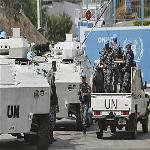21 December 2010

Photo: AP
UN forces patrol outside the UN headquarters in Ivory Coast, Abidjan, Ivory Coast, Dec 21, 2010
The international community is increasing pressure on incumbent Ivory Coast President Laurent Gbagbo to cede power after the U.N. Security Council voted Monday to extend the mandate of its 10,000-member peacekeeping force, despite Gbagbo's demand that they leave.
An increasingly defiant Gbagbo refuses to move aside for Alassane Ouattara, who was recognized by the United Nations and most of the international community as the winner of the Nov 28 presidential run-off.
Since then, the country has been stuck in a tense political gridlock, characterized by street violence that has killed dozens, an attack on U.N. peacekeepers, and what the United Nations says are hundreds of reports of killings and kidnappings.
U.N. Security Council president and U.S. Ambassador Susan Rice, warned Ivorian stakeholders they will be held accountable for attacks against civilians and peacekeepers.
"The members of the Security Council urge all Ivorians to exercise maximum restraint, remain calm, resist provocative actions, refrain from violence, and work together to restore sustainable peace," said Rice.
The U.N. Human Rights office has pointed to evidence of "massive violations of human rights" and says it is investigating reports of the discovery of a mass grave in Abidjan.
ECOWAS and the African Union have suspended Ivory Coast, after recognizing Ouattara as the election winner. The European Union has banned Gbagbo and 17 of his allies.
The United States says it is ready to sanction Gbagbo and his collaborators. White House Spokesman Robert Gibbs said Monday it is "time for Gbagbo to go."
Gbagbo and his supporters accuse foreigners of threatening Ivory Coast's sovereignty and the U.N. force of supporting Ouattara.
Interior Minister Emile Guieroulou said Monday the Gbagbo government is unfazed by sanctions.
Guieroulou said if the United Nations wants to maintain its force on their territory, against their will, they will not cooperate with them. He said if that force decides to cooperate with an interlocutor other than Gbagbo's government, which he said is the country's legal government, it will be placing itself with the rebellion and will be dealt with as such.
U.N. peacekeepers and former rebel fighters are protecting the Abidjan hotel serving as Ouattara's headquarters.
Representative for the U.N. mission in Ivory Coast, Young Jin Choi, said Monday armed men have been threatening U.N. staff in their homes, though Gbabgo's camp has denied involvement.
Choi said the U.N. mission will continue its work and its patrols, despite roadblocks and other efforts block them. He said the United Nations has a strong enough military and police presence at the Golf Hotel to repel any attempts to disrupt or attack the hotel.
The United Nations says it is investigating reports Gbagbo has brought in Liberian, and perhaps Angolan, mercenaries, a charge Gbabgo denies.
The U.N. High Commission on Refugees said fears of a return to civil war have prompted more than 6,000 Ivorians to flee to neighboring Liberia and Guinea. The U.N. agency said it has beefed up supplies in the two countries and is now prepared to cope with as many as 30,000 refugees.